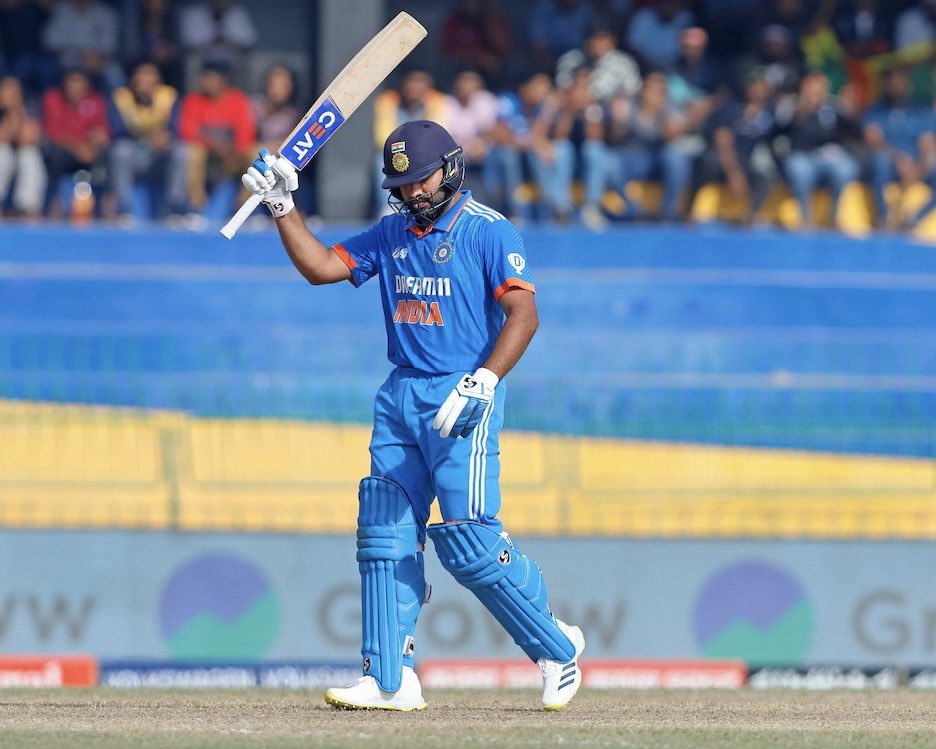
With the Asia Cup won and in style, the one man who would start to feel the most pressure is Rohit Sharma, India’s captain. The World Cup could well be his final opportunity to lead the team to an ICC Trophy, the promised land whose borders have been shut to India for more than a decade now.
Let me take you back a little.
It was the first time I was meeting Rohit since that fateful day in Manchester in July 2019, and it was expected that the conversation would turn to the World Cup at some point. “The five hundreds really don’t mean much anymore,” Rohit said in a very matter-of-fact manner. “Personally, it was a great achievement but when you are playing a team sport, it is never about personal milestones. When I reached home after the World Cup and everyone was congratulating me for the hundreds, I can very honestly tell you I did not feel any elation. The real prize was in the England dressing room and it was difficult to accept that we had not made the final.”
It was as if Rohit was mumbling to himself. He seemed a little distracted and we couldn’t make sense of what was going on. Seeing me slightly anxious, he smiled and said, “World event jeetna hai [Have to win a global event]. This is one obsession we have to fulfil.”
It was a kind of self-introspection. He was speaking to himself more than to me. He was desperate to win a world title, and it was as if his legacy as a cricketer depended on it.
Rohit is a leader, and for someone of his calibre, it is never about individual glory. As one of the most successful captains in franchise cricket, Rohit knows how to win. For him to have come close multiple times and not have a world title to show for the efforts in the last few years is not something he can accept. The World Test Championship final defeat in June is sure to rankle, and in that sense, the 2023 World Cup on home soil could well be his final shot at glory.
“Unless we win a world title, I will be very disappointed,” he said, forthright as ever.
Also Read: Ashwin a Surprise Inclusion for Australia ODI Series
The Leader
It was days before the Brisbane Test in January 2021, and I had broken the news that Jasprit Bumrah was injured and unlikely to play a part in the decider. Understandably, the news went viral within minutes, and social media was abuzz with what it meant for India’s chances at the Gabba. For me, this was routine work, and I did not think much about it until Rohit messaged. It was just before noon that he sent a long WhatsApp message requesting me not to break any injury-related news. The Bumrah update, Rohit argued, could help Australia and allow them to plan better for Brisbane. It was a tricky request. We are in the business of news, and it is part of our job to break important updates for our viewers and readers. And here was the Indian vice-captain requesting me not to do so for this one Test match.
I promised Rohit I would heed his request, for that’s what I believed was more important in the circumstances. Rohit, on his part, understood where I was coming from. The question is, why did Rohit do what he did? Did he not know that as media professionals, we needed to break news? By reaching out, he was taking a chance. First, it was corroboration that the Bumrah news was correct, and secondly, it gave insight into the mindset of the team going into the decider. Most importantly, the boundary between the player and the media was blurred for a moment, and that is not something we see happen too often. But that’s how Rohit is. He will go to any length to ensure that his team benefits, and if that means he has to do things differently, he wouldn’t hesitate to do so. Ask his teammates, and almost all of them swear by Rohit Sharma. He leads by example and makes the youngsters feel at ease when they are new to the dressing room. Not only that, he has been known to take them out for dinner to ease them into the pressures of international cricket.
He always maintains that as a leader, he is the least important member of the team. It is his job to help his teammates. “You can’t lead a cricket team in isolation,” he had said to me after taking over as captain. “You have to understand and talk to each and every player in your team to know what they are thinking and how they are approaching the game. You have to make sure that they buy into your strand of thinking, for only then can a successful cricket team get created. At MI [Mumbai Indians], we have many stars in the team and it has always been challenging as the captain of the side. I have thoroughly enjoyed the experience, and I have learnt a great deal from doing so. You learn to understand human minds better, tackle situations better, get exposed to different cultures and ideas and turn into a better human being.”
Afterwards, he highlighted how things had changed for him over time, as captain. “With time, you realise that as the leader you are the least important member of the team,” he said. “That’s how I now think, for if I have to take the team forward, I can’t do so myself without the support of the boys. That’s why I think I am the last member of the squad and the other ten are more important than me. In this way, I can get the best out of each of them.”
These are the words of a mature cricketer, of someone who has been around for a decade and more and has few insecurities.
Rohit will need every bit of that maturity come the World Cup. It’s his final opportunity. His fans will brook no failure and he knows that better than anyone. And in the Asia Cup, the batter in Rohit showed signs of getting back to the form that all of India has wanted to see for a while. That should come as a big relief, and give him the confidence he needs going into the World Cup. His time, clearly, is now. Now or never.
Also Read: Kuldeep Thanks Rohit for Upswing in his Bowling Fortunes




